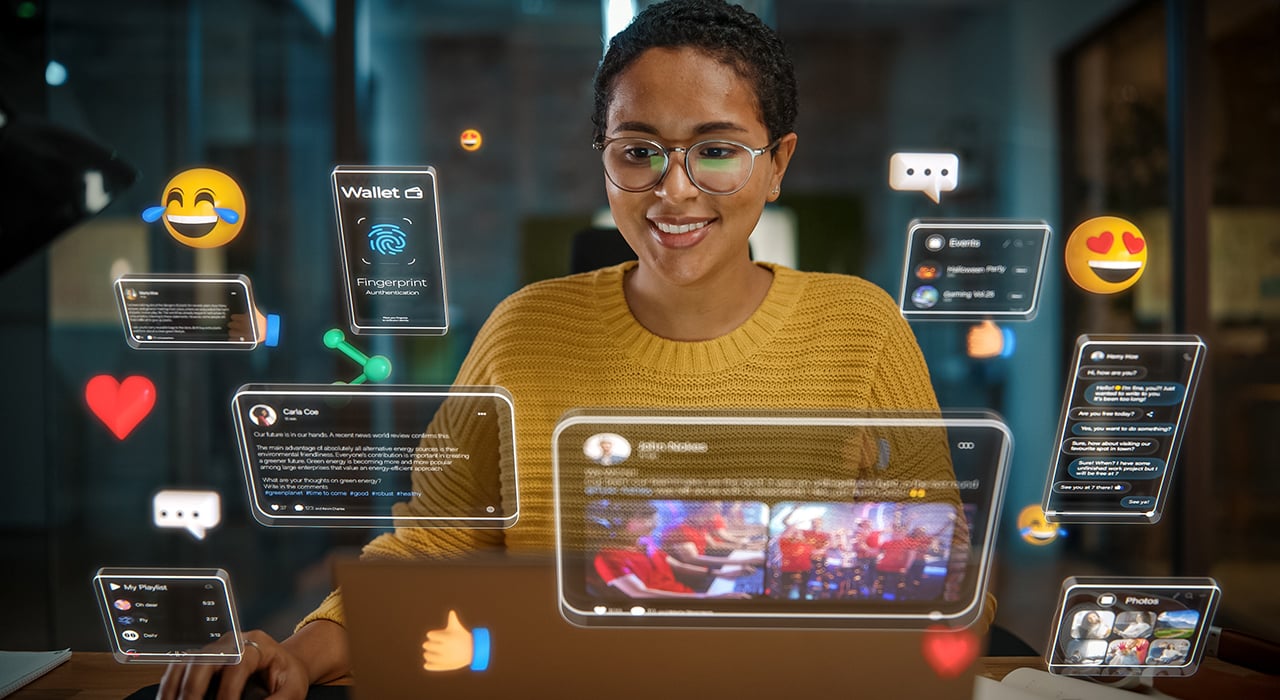News & Insights
Rise of the Machines: The future of AI in content marketing from a copywriter’s perspective

Dan Tull
Copywriter

AI programs have long been a staple of science fiction, with the development of computers that can learn and adapt being more akin to something to be feared rather than revered. Of course, the reality of AI is far less terrifying. The simplest definition of AI is a computer that is capable of performing tasks typically reserved for humans. Think more along the lines of autocorrect than Skynet.
You may have recently seen the flood of images populating social media accounts where people have generated dozens of arty portraits of themselves using artificial intelligence. These sorts of apps, that respond to key phrases and the users own image selection, have been floating around for some time, although only recently have made a significant impact online. The principle is quite simple, a program can scour the vast resources on the internet to discern an image that meets the criteria of the phrasing. If I want to quickly see what an image of a pirate riding a unicorn through the streets of Small Heath looks like, I no longer have to rely solely on the vivid imagery of my own mind.
But imagery is not where this story ends. Naturally the excitement of creating instant artwork has taken the online world by storm, but there is a deeper implication here than simply creating new profile pictures.
The same principle applies to all manner of mediums, specifically including writing, and since 2015 OpenAI has been working on something incredibly clever; an AI language model called ChatGPT that can generate sophisticated responses to a query that the user inputs. It might be easier to read what ChatGPT does in it’s own words:
ChatGPT is a variant of the GPT (Generative Pre-training Transformer) language model, which was developed by OpenAI. Like other language models, ChatGPT is trained on a large dataset of text and is able to generate natural language text by predicting the next word in a sequence based on the context provided by the words that come before it.
The key difference between ChatGPT and other language models is that it has been specifically designed and trained to engage in conversation with humans. This means that it is able to understand and respond to questions, make small talk, and carry on a conversation in a way that is similar to how a human might.
To do this, ChatGPT is trained on a dataset of conversations between humans, which allows it to learn about the structure and patterns of human conversation. It is also designed to take into account the context of the conversation and the history of the conversation so that it can generate responses that are relevant and appropriate.
This entire description of what ChatGPT does was generated in seconds by the program with the simple prompt of “Explain how ChatGTP works?”. That was all it needed to succinctly describe itself. It doesn’t stop there either, the program will generate near-perfectly worded responses to anything you type in, ranging from explaining ideas to creating stories. It is all dependent on the input.
What does this mean?
As a tool, this represents a significant milestone in the creation of content. It is not a replacement for the human element, they have yet to create an AI capable of autonomous inspiration so there still needs to be the genesis of an idea to set ChatGPTs wheels in motion. I spent the weekend trying out multiple different uses for the program. I had it rewrite some of my own work, generate its own paragraphs with a series of prompts, answer questions that I had, and even at one stage had it attempt a story. The results are quite staggering. Where ChatGPT really shines is its instant ability to answer questions in a way that should have Google looking nervous. Search engines as we know them will need to be reactive to this oncoming change. Why should I spend my time scrolling through a results page looking for the perfect solution to my query when I can now simply ask the friendly AI for help?
It also works extremely well for editing, this is perhaps one of the strongest spelling and grammar checkers I have encountered. You can be incredibly specific in the instructions and this allows for a degree of confidence in the program's ability to correct confusing word orders or compress lengthy sentences. All of the thought and complex elements of the copy still belong to the writer, this is simply a highly advanced tool for writers to use when self-checking their own work.
Creativity
The cracks start to show when tasking ChatGPT with anything that involves creativity. It had a good go at crafting a story, even being able to refer back to previous instalments to continue an established thread, but ultimately without the source of genuine inspiration the program only serves as a facsimile of an author's ability. This will likely serve as some relief to those who have heard about the rise of AI writers and the potential that could follow. Thankfully, we seem to be a way off from AI creating the next great novel.
Instead, we should look to AI programs like ChatGPT as tools to add to our arsenal. Think of the time-hungry tasks that everyone has to undertake, whether it be assembling an agenda or tidying up a document to make it just a bit more exciting. All of this is now possible with just a few keystrokes.
And just to really show you the power of AI, I made it compose a pros and cons list:
Pros:
- AI writers can work faster than human writers because they don't need breaks and can work continuously.
- AI writers can produce a large volume of content in a short amount of time, making them useful for tasks such as generating news articles or summarising long documents.
- AI writers may be more objective and unbiased than human writers, as they are not influenced by personal opinions or emotions.
- AI writers can be more accurate and consistent in their writing, as they do not make mistakes or typos.
Cons:
- AI writers may lack the creativity and originality of human writers.
- AI writers may struggle to understand and replicate the nuances of language and the subtleties of tone and voice that are important in effective writing.
- AI writers may not be able to handle tasks that require deep understanding or analysis, such as writing research papers or creating marketing copy.
- AI writers may not be able to adapt to changes in tone or style as easily as human writers.
The development of AI language models like ChatGPT represents a significant milestone in the creation of content. While it is not yet capable of autonomous inspiration, it has the potential to greatly assist humans in generating and editing written material. As AI continues to advance, it is important to consider the potential implications and benefits for various industries, including search engines and content creation. However, it is also important to recognise the limitations of AI and the need for human input and oversight. With responsible development and use, AI has the potential to greatly enhance and improve many aspects of our lives. For now, we are safe from our AI overlords.



